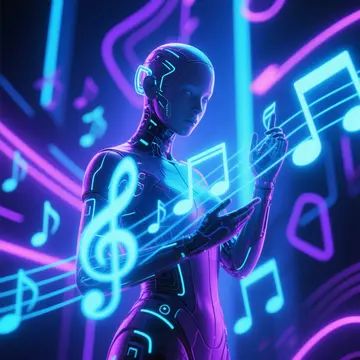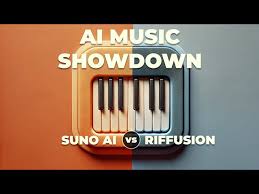Introduction: Are We Listening to Machines or Musicians?
As generative AI continues to transform creative industries, a burning question is rising in the music world:
AI vs human composers—what’s the actual difference in the music they produce?
With tools like Udio, MusicGen, AIVA, and Suno now capable of composing full tracks in minutes, it’s becoming harder for the average listener to tell who—or what—wrote a piece. But while the lines may be blurring sonically, there are still clear distinctions in process, purpose, and emotional depth.
This article breaks down how AI-generated compositions compare to human-created music in structure, emotion, originality, and artistic intent. Whether you’re a musician, producer, or just curious about where the future of music is heading, here’s what you need to know.

The Core Difference: Intent vs Prediction
At the heart of the difference is this:
Human composers write music with intent, often drawing from personal emotion, cultural memory, or storytelling purpose.
AI composers, by contrast, generate music through prediction, analyzing massive datasets to forecast what combination of sounds most likely matches a given style or mood.
AI imitates patterns. Humans express experience.
That fundamental divide influences everything from emotional resonance to how the music evolves over time.
1. Emotional Depth and Meaning
Human Composers:
Draw from lived experience
Use music as emotional or political commentary
Inject imperfection, tension, and vulnerability
AI Composers:
Simulate emotion using training data patterns
Can mimic the sound of emotion (e.g., sadness, joy)
Lack personal context or cultural nuance
Example:
A heartbreak ballad written by a singer-songwriter might carry subtle lyrical pain, uneven breathing, and intentional hesitations.
An AI-generated breakup song (via Udio or Suno) might hit the right notes, tempo, and mood—but often feels polished, safe, and emotionally distant.
2. Originality and Creative Risk
Human Composers:
Push genre boundaries
Experiment with atypical structures
Occasionally create something “imperfect” but groundbreaking
AI Composers:
Generate based on what already exists
Tend to stay within common patterns to optimize coherence
Struggle with originality without specific prompt engineering
Real Example:
Experimental jazz composer Esperanza Spalding weaves social commentary into harmonic chaos.
By contrast, MusicGen produces smooth, technically correct jazz backgrounds—but rarely anything that defies genre convention.
3. Structural and Thematic Consistency
AI Strengths:
Excellent at maintaining structural consistency (e.g., verse–chorus–bridge)
Can imitate specific genres with impressive technical accuracy
Outputs are clean, loopable, and time-efficient
Human Strengths:
Able to write long-form narrative compositions
Can use silence, dissonance, or tension as a storytelling tool
Flexible in bending structure to match emotional arc
Example:
An AI film score may capture the rising action of a scene but lack foreshadowing or subtext. A human composer might subtly plant motifs early on that evolve and reappear later in the film—something AI still finds difficult to execute reliably.
4. Adaptability and Cultural Relevance
Human Composers:
Reflect the times, politics, language, and cultural narratives
Tap into collective memories and community trauma or joy
Often channel personal or national identity
AI Composers:
Don’t understand historical or social context
Can unintentionally produce “culturally tone-deaf” results
Require guidance to reflect cultural meaning
AI can generate a “hip-hop beat,” but it won’t understand the genre’s roots in protest, identity, or resilience.
5. Speed and Scalability
Here’s where AI dominates.
AI Tools (like Suno, Udio, MusicGen):
Can generate songs in seconds or minutes
Produce consistent outputs 24/7
Don’t need sleep, inspiration, or time off
Human Composers:
May take days, weeks, or months to write one piece
Work best when inspired or emotionally invested
Often limited by time, tools, and energy
In short: If you need 100 tracks for a mobile game, AI is unbeatable.
But if you need one unforgettable, soul-stirring score, a human may still be your best bet.
Summary Table: AI vs Human Composer Outputs
| Aspect | Human Composer | AI Composer (e.g., MusicGen, Udio) |
|---|---|---|
| Emotional Intent | Personal, felt, nuanced | Simulated from data patterns |
| Originality | High, with creative risks | Medium, bounded by training data |
| Cultural Relevance | Deep, contextual | Surface-level, needs human guidance |
| Output Speed | Slow to medium | Very fast (seconds to minutes) |
| Structure Consistency | Flexible and expressive | Very consistent, sometimes too safe |
| Adaptability in Genre | High, with hybrid experimentation | High within prompt, limited outside scope |
| Licensing and Ownership | Fully owned by creator | Depends on platform & terms |
Should AI and Humans Compete or Collaborate?
Here’s the reality: The best music in the future may not be AI vs human—but AI with human.
AI tools can:
Generate harmonic ideas or rhythmic loops
Suggest melody lines or vocal phrasing
Score temp tracks for rapid prototyping
Human creators can:
Add emotional nuance
Infuse meaning and intentionality
Interpret and perform the music with feeling
Think of AI as a musical assistant—not a replacement.
Conclusion: What's the True Difference?
The real difference between AI and human composers isn’t always obvious in a short Spotify loop or social media ad. But over time, it becomes clear:
AI mimics. Humans express.
AI creates patterns. Humans tell stories.
AI follows. Humans lead.
AI will continue to evolve. And human composers will evolve with it—adapting new tools to push music further than ever before. The difference in output today is noticeable. The future, however, is about synergy, not supremacy.
FAQs
Can AI music be copyrighted?
Pure AI-generated works may not qualify for copyright protection in all countries. Hybrid works involving human input often can.
Is AI music replacing real musicians?
Not entirely. It’s replacing low-budget or stock compositions but not high-end scoring or live performance needs.
Can people tell the difference between AI and human music?
In blind tests, many can’t. But over long compositions or live settings, human-crafted music tends to feel more emotionally resonant.
Are human composers using AI too?
Yes. Many now use AI to generate base melodies, accompaniments, or even lyrics—speeding up the creative process.
Learn more about AI MUSIC








